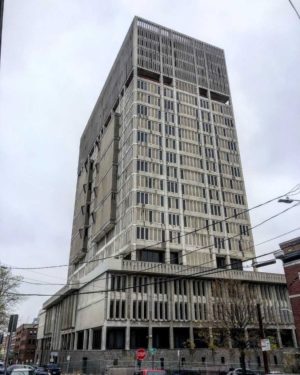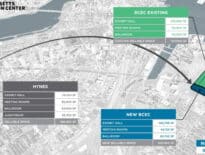
Developer Leggat McCall hopes to convert the former Sullivan Courthouse to 430,000 square feet of office space and 48 affordable apartments. Photo by Steve Adams | Banker & Tradesman staff.
With a key Cambridge City Council vote earlier this week now behind it, it appears that Leggat McCall Properties’ proposal to convert the former Sullivan Courthouse in East Cambridge to a mixed office-residential tower has cleared its biggest hurdle.
Leggat McCall won the right to redevelop the state-owned tower in 2012 and signed a $33 million purchase-and-sale agreement with the state Division of Capital Asset Management and Maintenance (DCAMM) in 2013. The firm estimates asbestos abatement and other construction costs will run as high as $50 million.
To get planning board approval to convert the 22-story shell into 430,000 square feet of office space and affordable apartments in 2014, the developer also had to secure a long-term lease from the Cambridge City Council on 420 spaces in a nearby, city-owned parking garage.
However, at the Wednesday night meeting where the council was set to consider the lease, key swing vote Councilor Sumbul Siddiqui proposed a compromise: double the building’s number of affordable housing units to 48 and shrink the number of parking spaces leased by 150, to 270. In addition, Leggat McCall was asked to pay an additional $3.5 million to the city’s affordable housing fund 18 months after a certificate of occupancy is granted for the building, on top of a $7 million payment already promised.
With the backing of Leggat McCall representatives, the proposal passed the council, 6-3. The developer must now return to the Cambridge Planning Board for an amendment to their 2014 special permit, incorporating the conditions set forward by the City Council.
Neighborhood opposition to the project, led by state Rep. Mike Connolly, centered on a proposal for the city to buy the tower instead of Leggat McCall for a reduced price and convert it to affordable housing. However, in a letter to the council, City Manager Louis DiPasquale dismissed that plan as unworkable after the city’s repeated efforts to work out a deal with DCAMM failed.
“DCAMM has reiterated repeatedly that the courthouse is a valuable asset and that it expects to obtain fair market value in any disposition of this property. DCAMM believes the fair market value of the courthouse exceeds $30 million prior to any costs associated with remediation and redevelopment,” he wrote. “DCAMM is committed to LMP’s redevelopment of the courthouse and is in support of the municipal actions that are required to complete the transaction and to begin the redevelopment of the courthouse.”
The city would not have the resources to attempt the conversion itself, he added.
“Because of the high baseline costs of the Courthouse Project, including the acquisition cost of at least $30 million and the remediation costs estimated by LMP to be at least $50 million, public funding for affordable housing from other sources would not likely be available,” he wrote. “Therefore, the construction of 100 percent affordable housing in this facility is neither economically feasible nor is it realistic to suggest that the city would ever be in a position to acquire, remediate and renovate the courthouse for 100 percent affordable housing.”






